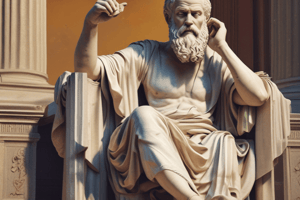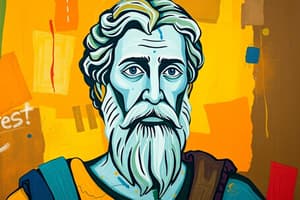Podcast
Questions and Answers
What is 'The Apology'?
What is 'The Apology'?
Plato's account of the three speeches that Socrates gave at his trial for false teaching and heresy in 399 B.C.E.
What age was Socrates during his trial?
What age was Socrates during his trial?
- 80
- 50
- 71 (correct)
- 60
Socrates trusted the written word.
Socrates trusted the written word.
False (B)
Who translated 'The Apology'?
Who translated 'The Apology'?
What did Socrates urge his fellow Athenians to do?
What did Socrates urge his fellow Athenians to do?
What was Socrates' stance on death?
What was Socrates' stance on death?
Who was an attendant at Socrates' trial?
Who was an attendant at Socrates' trial?
Flashcards are hidden until you start studying
Study Notes
Overview of "The Apology"
- Written by Plato, presenting Socrates' defense during his trial in 399 B.C.E.
- Socrates, 71 years old, challenged the notions of truth and wisdom, emphasizing the importance of self-examination among Athenians.
- The trial centered on charges of false teaching and heresy.
Socratic Philosophy
- Urged Athenians to critically evaluate their lives and those in positions of power.
- Highlighted the pursuit of wisdom as central to a fulfilling life.
- Assured his followers that death should not be feared, framing it as a transition rather than an end.
Role of Plato
- Plato witnessed both the trial and execution of Socrates, documenting events for future generations.
- Socrates' aversion to writing meant his teachings relied heavily on students like Plato for preservation.
Structure of "The Apology"
- Comprises a series of speeches that outline Socrates' defense and philosophical beliefs.
- Divided into sections covering his defense, the penalty phase, and his final farewell to Athens.
Key Themes in Socratic Defense
- "I am Not Eloquent": Acknowledges his lack of speaking skills but prioritizes truth over rhetoric.
- "My First Accusers": Responds to initial charges from those who first slandered him.
- "Why I Am Called Wise": Challenges the notion of wisdom, suggesting he is wise for recognizing his own ignorance.
Socratic Method and Beliefs
- "The Origin of My Method": Discusses his approach to philosophy, prioritizing inquiry and dialogue.
- "Tell Me Meletus": Engages accusers directly, showcasing his method of questioning to reveal contradictions.
- Believes he is a crucial figure for the welfare of Athens, claiming "I Am God’s Gift to Athens."
Socrates’ Political Stance
- "Why I Teach But Do Not Engage In Political Life": Prefers philosophical inquiry over political involvement, advocating for wisdom in governance.
- "Why I Will Not Beg For Mercy": Refuses to compromise his principles for personal safety, remaining steadfast in his beliefs.
Penalty Phase Insights
- "A Close Vote": The trial concluded with a narrow decision regarding his guilt.
- "What Do I Deserve?": Socrates suggests a reward for his contributions rather than punishment, highlighting his commitment to his philosophy.
Final Reflections
- "You Have Condemned Yourselves": Asserts that the actions of the court reflect more on the judges than on him.
- "Death is a Blessing": Portrays death in a positive light, suggesting it is either a peaceful rest or an opportunity for further inquiry in the afterlife.
- "Goodbye": His parting words encapsulate his unwavering commitment to philosophy and truth.
Studying That Suits You
Use AI to generate personalized quizzes and flashcards to suit your learning preferences.




